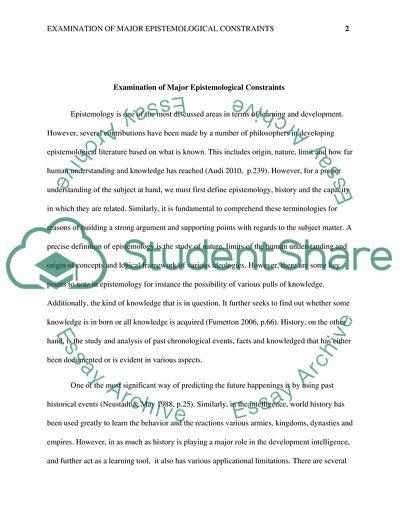Cite this document
(Examination of Major Epistemological Constraints Essay Example | Topics and Well Written Essays - 3000 words, n.d.)
Examination of Major Epistemological Constraints Essay Example | Topics and Well Written Essays - 3000 words. https://studentshare.org/history/1760960-analyse-the-major-epistemological-limitations-to-the-use-of-history-as-a-learning-tool-in-light-of-these-what-use-is-the-study-of-history-to-the-field-of-intelligence
Examination of Major Epistemological Constraints Essay Example | Topics and Well Written Essays - 3000 words. https://studentshare.org/history/1760960-analyse-the-major-epistemological-limitations-to-the-use-of-history-as-a-learning-tool-in-light-of-these-what-use-is-the-study-of-history-to-the-field-of-intelligence
(Examination of Major Epistemological Constraints Essay Example | Topics and Well Written Essays - 3000 Words)
Examination of Major Epistemological Constraints Essay Example | Topics and Well Written Essays - 3000 Words. https://studentshare.org/history/1760960-analyse-the-major-epistemological-limitations-to-the-use-of-history-as-a-learning-tool-in-light-of-these-what-use-is-the-study-of-history-to-the-field-of-intelligence.
Examination of Major Epistemological Constraints Essay Example | Topics and Well Written Essays - 3000 Words. https://studentshare.org/history/1760960-analyse-the-major-epistemological-limitations-to-the-use-of-history-as-a-learning-tool-in-light-of-these-what-use-is-the-study-of-history-to-the-field-of-intelligence.
“Examination of Major Epistemological Constraints Essay Example | Topics and Well Written Essays - 3000 Words”. https://studentshare.org/history/1760960-analyse-the-major-epistemological-limitations-to-the-use-of-history-as-a-learning-tool-in-light-of-these-what-use-is-the-study-of-history-to-the-field-of-intelligence.


